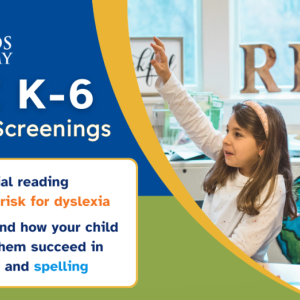Get a snapshot of your child’s literacy skills and determine if there is a risk of dyslexia.
For the second year, Friends Academy is offering free literacy screenings to children in Kindergarten-Grade 6. The goal of this service is to provide families with a snapshot of their child’s literacy skills (including reading, spelling, and written expression) and help determine if there is a risk of dyslexia.
The 45-minute screenings take place one Saturday per month on Friends Academy’s campus at 1088 Tucker Rd., North Dartmouth, MA. Children will be administered assessments tailored to their current developmental and/or grade level. The screenings are available to any child who is not currently enrolled at Friends Academy.
Families who are interested in signing up for a free literacy screening can complete the literacy screening interest form.
Literacy screenings are performed by highly skilled faculty with Sally Borden Connect: a program of Friends Academy that offers group classes, tutoring, assessments, and other support services for children with language-based learning differences and executive function challenges. Connect is an offshoot of the Sally Borden Program, which is an integrated program for Friends Academy students with dyslexia, dysgraphia, dyscalculia, and other language-based learning differences.
On the literacy screening interest form, parents/guardians will be asked to describe their child’s situation and list any evaluations or services their child has received. Once Friends Academy determines that a literacy screening is appropriate for the child, an evaluator will contact the family to sign up for a date and time. Screenings will begin in October, in conjunction with Dyslexia Awareness Month.
Families can use the results of their child’s screening to take next steps, such as meeting with their child’s school, signing up for small group classes or tutoring at Friends Academy, or conducting a more comprehensive educational assessment. Friends Academy may also provide recommendations for evaluators and/or educational advocates to help families make appropriate choices for their child’s learning.
“Our end goal is to provide the families with information that will help them better understand their child and get them what they need to be successful,” said Kendal Martes, director of outreach at Friends Academy and a certified speech-language pathologist.
Dyslexia affects an estimated 5-17% of children in the general population. It is typically diagnosed after a child has struggled to learn how to read – even though dyslexic students usually show signs of difficulty well before then. Literacy screenings can help identify reading challenges as early as Kindergarten, when research shows intervention is most effective.
Although the Massachusetts Department of Elementary and Secondary Education requires literacy screenings for all public school students in grades K-3, implementation varies widely from district to district, and screenings may not capture the needs of students who have already passed the recommended age.
“We are offering these screenings because we know the need exists to identify younger children who are at risk for difficulty in learning to read,” Ms. Martes said. “We hope to bring awareness of how common dyslexia and related learning differences are, and to empower caregivers and educators to support these learners.”
































